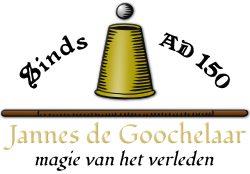
17th century
Magic words
In the 17th century we first encounter the term 'Hocus Pocus'. Thomas Ady wrote in 1655 in his book, "A Candle in the Dark":
‘I will speak of one man … that went about in King James his time … who called himself, The Kings Majesties most excellent Hocus Pocus, and so was called, because that at the playing of every Trick, he used to say, Hocus pocus, tontus talontus, vade celeriter jubeo’
But even more so, a magic booklet appears as early as 1634 entiteled: ‘Hocus Pocus Junior’ and the great thing is there's a lot of magic spells in here like:
Vade, courageous / Passa, couragious
Hei Fortuna nunquam credo, vade courageous
Jubeo celeriter
Mercus mercurius, by the powder of experience, Jubeo
Fortuna variabilis. Lapis inestimabilis, Jubeo, vade, courageous
Vade couragious, celeriter vade
We go even further back in time: In the "Discoverie of Witchcraft" (1584) some of the trick descriptions apparently contain usual 16th century magic spells:
Using magic words, such as: Hey, fortuna furie, nunquam credo, passe, passe when come you sirra
Use words, such as: Ailif, casyl, zaze, hit mel meltat; Saturnus, Jupiter, Mars, Sol, Venus, Mercurie, Lunaor such like
and use certain words over it, such as: Droch myroch, & senaroth betu baroch assmaaroth, rousee farounsee, hey passe passe etc.
Either we overlook a nice collection of Latin jabbertalk. Did they use this for artistic reasons, for convenience or to make it clear that it is not really magic but wants to look like it?
By the way, what about those magic spells we all still know?
Hocus Pocus Pilatus Pas
Hocus Pocus zou een verbastering zijn van de woorden die Christus sprak tijdens het laatste avondmaal: “Hoc est corpus meum”, wat betekent: “Dit is mijn lichaam”. Pilatus Pas verwijst naar Pontius Pilatus. De bijbehorende religieuze handelingen kwamen op het kerkvolk misschien als “gegoochel” over.
It is also possible that it refers to the Latin nonsense text "Hax pax max Deus adimax" but this does not seem very likely. So it was known at least in the 17th century and probably much longer.
Sim Sala Bim
This is definitely an post-medieval word. It was introduced by the famous (originally Danish) illusionist Dante (1883 - 1955) who gave one of his shows this name but actually it comes from a Danish fairy tale.
Abracadabra
This mystical word would come from the Kabbalah but its origin is mysterious. The best known theory is that it came from ancient Greece via the French language. However, this is also contradicted and it would even be of Babylonian origin. The most assigned meaning is: (I will) create as spoken, but in Arabic or Armenian it means destruction, or disappear. Others say it derives from the three Hebrew words: Ab, the father, Ben, the son, and Acadsch, the holy spirit. It appears for the first time in writing in a Latin recipe book in the 2nd century AD. It was written in a triangular form on paper with a linen thread around the neck to be worn against malaria fever attacks. The omission of letters would symbolize the banishing of evil.


